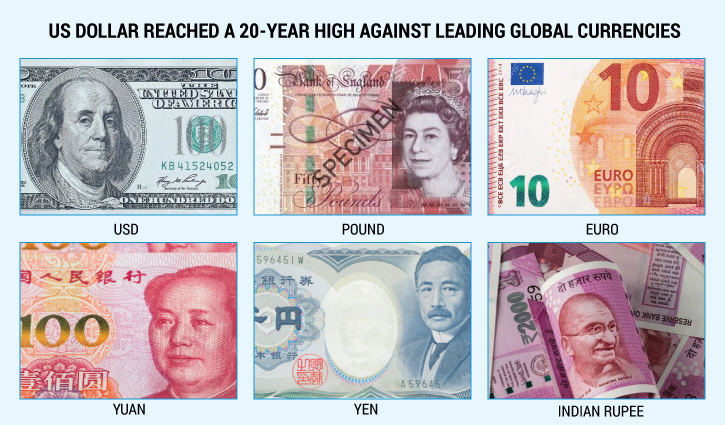Why dollar getting stronger, while other major currencies falling?
BI Analysis || BusinessInsider

Graphics: Business Insider Bangladesh
The US dollar, by which most of the global trade is done, is strengthening against leading currencies as many investors consider the greenback a safe investment in turbulent times.
Currencies including the British pound and Japanese yen hit an all-time low against the greenback on Monday. The value of the euro also went down to more than 20 years low against the dollar in recent days. Last week the Bank of Japan intervened in the currency market for the first time since 1998.
The Chinese yuan has been added to this list as it slid against the dollar. Yuan dropped to its lowest level since data first became available in 2011. Also, the Indian rupee hit a record low just two days ago.
Bangladesh has also been impacted badly by the rise of the dollar as its import bills soar because of the falling taka against the greenback. Before Bangladesh Bank’s intervention two weeks ago, the dollar exchange rate was as high as Tk 108-110 for settling import payments.
On the other hand, the US dollar is getting stronger day by day and reached a 20-year high against a group of major global currencies.
Why is the dollar rising?
The Federal Reserve Bank of the USA has hiked interest rate thrice – each time 75 basis points – since June this year in a bid to tame rising inflation. As a result, the dollar is soaring to multi-decade highs against other currencies including the yen, pound, and euro.
Kenneth Rogoff, an economics professor at Harvard University and a former chief economist at the International Monetary Fund, has recently said: The dollar has been rising in large part because the Federal Reserve is on track to increase interest rates faster than other major countries.
Now, central banks around the world are following the US Fed in their campaign against inflation. The central bank of England said it will not hesitate to raise policy rates more aggressively following its 50-basis points hike this month.
Reverse currency wars
China and the United States have been taking very different paths in response to economic issues at home.
The People’s Bank of China (central bank) has been reducing interest rates to recuperate growth in an economy hit by Covid-19 lockdowns. On the other hand, the US Fed looks very aggressive in the opposite direction as it focuses on controlling inflation anyhow.
Such a divergence is not wholly problematic, Joseph Capurso, head of international and sustainable economics at the Commonwealth Bank of Australia told the BBC.
Yuan fall can be helpful for exporters in China because it would make their goods cheaper and so could increase demand, he said.
























